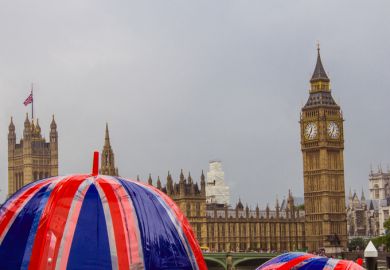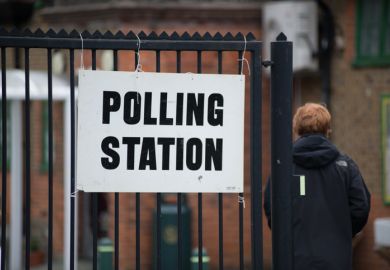A surge in support for Reform UK is “bad news” for universities because it could push the UK government further to the right on issues such as international students and campus “cancel culture”, according to experts.
The populist right-wing party edged ahead of Labour in a national opinion poll for the first time last week, a symbolic moment that reflects growing support for Nigel Farage’s latest outfit.
Farage and four others were elected as the first Reform MPs last July and the party is seen as a threat to both the Conservatives and Labour, with the centre-left governing party predicted to lose the most seats should Reform retain its support into the next election.
Reform has said little about higher education since it was formed out of the Brexit Party in 2022, although its manifesto at the last election did pledge to only permit international students with “essential skills” to stay post-graduation and to cut funding for universities seen to be undermining free speech.
The reluctance of Reform to formulate concrete policies allows it to “walk the tightrope” between left and right as supporters can prescribe their own values on to the party, said Andrew Roe-Crines, senior lecturer in British politics at the University of Liverpool.
It also leaves the major parties having to respond to the perceived threat of Reform by “trying to pre-empt some of the things they think Reform are going to do”.
“They will look to steal their clothes, to take the wind out of their sails. We may see some of that in the policies from Labour and the Conservatives, mimicking what they think Reform may want to do,” Roe-Crines said.
Labour has signalled a warmer approach to international students since coming to power but is under pressure to appear tough on immigration, in part because of the threat of Reform, and many believe it hasn’t ruled out making changes to policies such as the two-year graduate visa. It has also recently decided to revive contentious legislation that seeks to police free speech on campuses despite fears it is unworkable, in another possible sign of pressure from the Reform agenda.
Keir Starmer’s party had shown signs of shifting to the right post-election, said Aurelien Mondon, senior lecturer in politics at the University of Bath and co-convenor of the Reactionary Politics Research Network, adding that this was “bad news for higher education”.
“The fear of Reform in particular and the exaggeration of its popularity has led the Labour government to cater almost exclusively to what they see as their typical voter. This means that anyone beyond is no longer considered part of ‘the people’. In this setting, it is clear that university students and staff are not a priority,” Mondon said.
“Worse, as Labour embraces the culture wars and various moral panics on immigration, trans rights and so on, universities are likely to be in the firing line.”
Roger Eatwell, emeritus professor of politics at the University of Bath and an expert on populism, said Reform will also shy away from taking a stance on the big problems facing the sector.
“A populist party with strong working-class support is hardly likely to see itself gaining votes by promising a significant increase in fees or championing humanities and social science courses,” he said.
“Reform is also not likely to openly face the big issue of closing universities, especially in areas it is targeting. So largely avoiding vital core issues is likely to be its way forward.”
Roe-Crines felt that Reform’s wider attitude to higher education would be informed by its Thatcherite approach to economics, leading it to favour a marketised system with increased private sector involvement and a renewed focus on the economic outputs of degree programmes.
The closest the party has to an “intellectual” is Eatwell’s former collaborator Matt Goodwin, who has expressed support for the party, although is not known to be a member.
Goodwin’s recent book, Bad Education, written after he left academic employment to pursue opportunities on Substack and GB News, may provide further clues to how Reform’s higher education agenda might take shape, said Eatwell. It argues that a left-wing culture on campuses forces academics to self-censor and restricts free speech.
Register to continue
Why register?
- Registration is free and only takes a moment
- Once registered, you can read 3 articles a month
- Sign up for our newsletter
Subscribe
Or subscribe for unlimited access to:
- Unlimited access to news, views, insights & reviews
- Digital editions
- Digital access to THE’s university and college rankings analysis
Already registered or a current subscriber?








